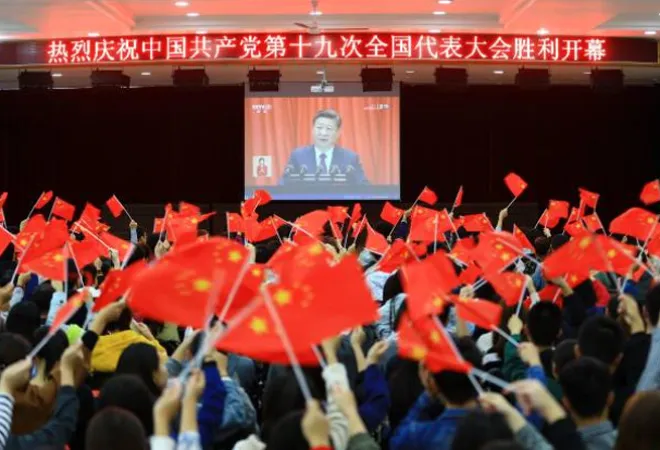
The US President Joe Biden’s Democracy Summit held on 9th–10th December triggered an intense debate on democracy in China. China’s State Council Information Office released the “Democracy in China” white paper on 4 December, followed by the Chinese Ministry of Foreign Affairs releasing the white paper “The State of Democracy in the United States” on 5 December. Various conferences, seminars, discussion sessions were organised throughout the month, which were attended by Chinese bureaucrats and top scholars/strategists from China and abroad to debate and discuss ‘democracy’. China’s state media also ran a high decibel campaign targeting the democracy summit. In fact, some Chinese scholars dedicated December 2021 as the global “Democracy Contest Month”, with the US and China as the two main protagonists.
Various conferences, seminars, discussion sessions were organised throughout the month, which were attended by Chinese bureaucrats and top scholars/strategists from China and abroad to debate and discuss ‘democracy’.
This is clearly a new trend in China. For long the word “democracy” has been a taboo in the country. Chinese scholars, strategists, officials often evaded the issue altogether and rarely discussed it in public. China so far had little or nothing to offer to the global democracy discourse. But apparently, things are a changing. Now, more and more Chinese scholars are of the opinion that China must actively participate and contribute to the global democracy discourse and not cede ground to others, particularly the US to dominate the space and use it as a soft power tool to further its foreign policy agenda.
The key arguments advanced
The Chinese side’s key argument against the US democracy summit was that—from trade war to democracy war, the US's containment policy vis-á-vis China has been deepening, rather than subsiding, that Biden-ism has finally moved towards a “Trump +” model in dealing with China. By organising the “Democracy Summit”, they argued, the US has consciously opened up an ideological front in the process of containing China, attempting to divide the international community to build a value-based alliance against China, triggering a new Cold War, therefore, driving history backward. Launching an asymmetric cultural war against China, they argued, the US is striving to integrate its ally system, impose the obligation to act in concert with democracy, form a “democratic anti-China united front”.
Some conjectured that the US may use democracy as the key criteria for the reconstruction of the global industrial chain security system, establish new industrial standards and trade rules between democratic countries, and discriminate against and exclude China and other countries labeled as “non-democratic”. Others even suspected a greater international conspiracy behind the summit. They found uncanny similarity between Biden’s “Democracy Project” and the history of the formation of the United Nations—a model designed to primarily accommodate the members of the anti-fascist coalition. Biden, they argued, is striving to set up a new global international organisation, a new United Nations under the leadership of the US.
The Chinese side’s key argument against the US democracy summit was that—from trade war to democracy war, the US's containment policy vis-á-vis China has been deepening, rather than subsiding, that Biden-ism has finally moved towards a “Trump +” model in dealing with China.
Invitation to Taiwan and presence of Luo Guancong, a former Hong Kong legislator at the occasion, further agitated the Chinese side, which accused the Biden administration of seeking to incite colour revolution in China. Such “blatant and malicious provocation”, many argued, required a strong counteroffensive from China—“defensive in form but offensive in essence”.
The counterarguments
1. The US is no democracy
One line of thinking within Chinese strategic circles is that just as the US does not recognise the qualifications and existence of “Chinese democracy”, China should also not recognise the US democracy. For example, scholars like Zhang Weiwei, Distinguished Professor of Fudan University, publicly asserted that “the American democracy is no democracy”. It is democracy of a few people or a few interest groups, kidnapped, and distorted by a handful of oligarchs and their money power. Similarly, various studies pointed out how democracy and human rights in the US have been breathing and groaning under the weight of capital.
The other line of thinking is that, it is unrealistic to discount the US as a democracy altogether and therefore, the Chinese critique should focus on the “democratic deficit” that it is currently facing. Here the US is often projected as a wounded, morbid democracy, which is in deep trouble, already started falling apart and in need of urgent reforms. It is argued that the increasing political polarisation, lack of social trust, widening disparity between the rich and the poor, its mishandling of the corona crisis make it unfit to be the leader for the democratic world.
However, the overall consensus is that the model of American democracy, is not a matter of China’s envy but of its pity, because what the China sees is not the “end of history but the end of the end of history”. It is argued that for the Chinese people, especially for the younger generation, American democracy has become a joke, while Taiwan’s democracy is a bigger joke. The democracy summit, thus, became a target of much ridicule and sarcasm on the Chinese internet, some even calling it a “comedy show”—which can neither eliminate the huge endogenous “democratic deficit” in the United States, nor can it effectively build an anti-China alliance based on ideology.
2. China is the true democracy
China’s Vice Foreign Minister Le Yucheng, at a high-level conference on democracy, spoke extensively about, what he called, “a thriving and flourishing free and democratic China”. He described China’s political system as “true democracy, effective democracy, successful democracy, a well-deserved democracy”—which conforms to the national conditions of the country and is supported by the people. The minister’s argument was mainly based on China’s comparative success in issues like poverty reduction, overall economic development of its people, pandemic management, amongst others.
The overall consensus is that the model of American democracy, is not a matter of China’s envy but of its pity, because what the China sees is not the “end of history but the end of the end of history”
Various Chinese strategists echoed the idea and described the current political system in China as “People’s democracy”, “deliberative democracy”, “whole process democracy”, one that is not a fancy or formality-based democracy, but truly allows the people to enjoy happiness and benefit from it. China, they said, does not pursue “democracy of procedures (electoral)” but “democracy of substance” or a “better quality democracy”. Some Chinese strategists are even of the opinion that in the next step China should organise the future “Global Democracy Summit” and inclusively invite the United States to participate in it.
Furthermore, there is a view that Chinese efforts should not stop at arguments and rhetoric or exposing the shortcomings of others. Instead, it must blaze a trail at the theoretical level to support its various on-ground successes. China, they argue, must strive to bring in a major paradigm shift in the global democracy debate, which is to make it shift from the “democracy or autocracy” paradigm defined by the West to the “good governance or bad governance” paradigm.
3. Reconstruction of democratic theory
An interesting trend in this regard is how Chinese strategists are carrying out an extensive theory "building exercise, striving to construct a democratic theory that transcends the existing “democracy and authoritarian (totalitarian) binary” and help legitimise Chinese political system as yet another form of democracy.
The Chinese argument is that such binary was formed during the Cold War days, when there was an antagonistic and confrontational relationship between socialism and capitalism, market economy versus planned economy; socialist democracy versus capitalist democracy. However, China's reform and opening up have led to the significant changes in these concepts—like decoupling of democracy and elections, socialism, and planned economy, making the original antagonistic relationship between these ideas somewhat blurred.
Chinese strategists are keen to project it as a specific democratic subtype that is parallel to the subtype of Chinese democracy.
Their effort now is to transform democracy–autocracy dualities into a triad. In this triangular structure, democracy is at the top, as a universal common value of mankind, and all systems realising this universal value is a democratic government. Under this, Chinese democracy and Western democracy constitute two subtypes. This is meant to challenge the common understanding that Western-style democracy is universal. Instead, Chinese strategists are keen to project it as a specific democratic subtype that is parallel to the subtype of Chinese democracy. This facilitates the Chinese argument that competitive elections are just a measure of Western style democracy, but not a measure of democracy as a whole. In other words, it is a secondary standard, a standard for distinguishing different subtypes, but is not a primary standard, therefore, not applicable to “Chinese democracy”.
To sum up, Biden’s global democracy summit created much ripples within the Chinese strategic circles. However, beyond the angry posturing and aggressive rhetoric, one should not miss China’s deep interest in turning the global democracy discourse into a strategic stalemate or a protracted war between the US and China—where the focus is not on reaching any consensus or compromise, achieving victory or conceding defeat, but solely on ensuring China’s participation and persistence. And, in the process, introducing, popularising and legitimising, both domestically and internationally, the concept of “Chinese democracy”—something that has been unheard of so far.
The views expressed above belong to the author(s). ORF research and analyses now available on Telegram! Click here to access our curated content — blogs, longforms and interviews.




 PREV
PREV


